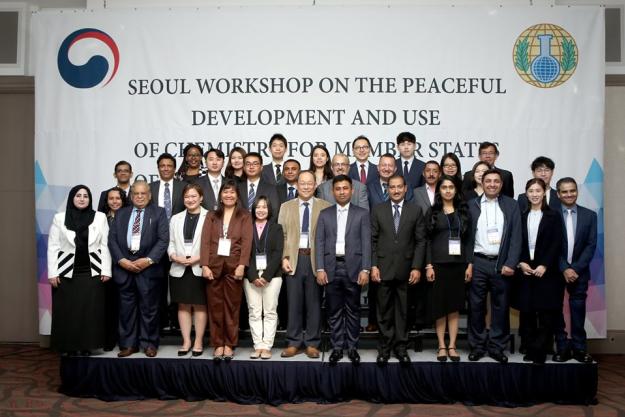
Participants at the 8th Workshop on Peaceful Development and Use of Chemistry
THE HAGUE, Netherlands — 5 November 2019 — Chemical practitioners, specialists, and decision-makers shared policies and best practices to help enhance the peaceful development and use of chemistry during an Organisation for the Prohibition of Chemical Weapons (OPCW) and the National Authority of the Republic of Korea workshop in Seoul, Republic of Korea, from 29 – 31 October.
The workshop focused on developing effective safety and security frameworks when working with high-risk chemicals. Areas addressed included accident prevention and preparedness, human factor analysis, safety and security principles, scenario-based strategies, and the development of effective action plans for safety management.
Director of the Disarmament and Non-Proliferation Division of the Korean Ministry of Foreign Affairs, Mr June-byoung Park, and Managing Director from Korea Specialty Chemical Industry Association, Jai youl Yang, highlighted the importance of managing toxic industrial chemicals and precursor materials. Mr June-byoung Park stated: “We must modernise the management of such materials and apply industry best practices throughout the whole cycle – production planning, supply chain, and distribution”.
OPCW Head of the International Cooperation Branch, Mr Li Zhao, expressed: “Korea’s strong support of the implementation of the Chemical Weapons Convention (CWC) and their voluntary contributions are invaluable to various areas of the OPCW, such as, capacity building workshops and activities”.
Workshop attendees also visited the Korea Research Institute of Chemical Technology (KRICT) to learn about practical applications of chemical technology for industry in Republic of Korea.
This was the 8th Workshop on Peaceful Development and Use of Chemistry and was attended by government officials responsible for chemical industries, small to medium-sized chemical industry professionals, academics, and chemists from Bangladesh, China, Iraq, Jordan, Malaysia, Myanmar, Pakistan, Palestine, Philippine, Republic of Korea, Sri Lanka, Saudi Arabia, and Viet Nam.
Background
As the implementing body for the Chemical Weapons Convention, the OPCW, with its 193 Member States, oversees the global endeavour to permanently eliminate chemical weapons. Since the Convention’s entry into force in 1997, it is the most successful disarmament treaty eliminating an entire class of weapons of mass destruction.
Over 97% of all chemical weapon stockpiles declared by possessor States have been destroyed under OPCW verification. For its extensive efforts in eliminating chemical weapons, the OPCW received the 2013 Nobel Peace Prize.
